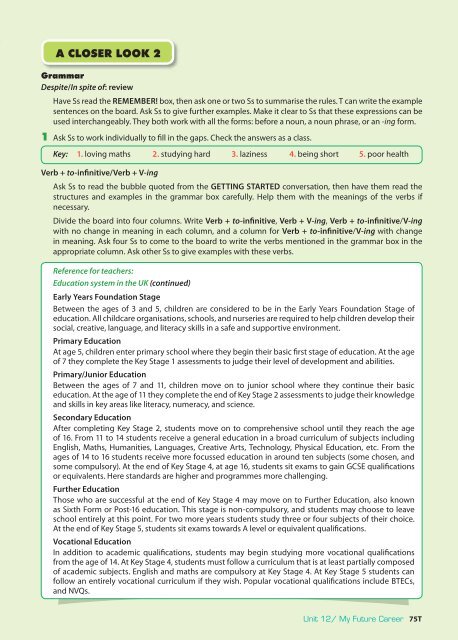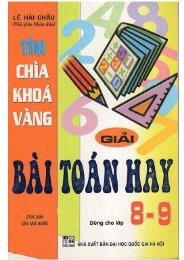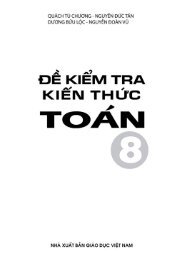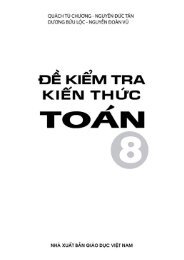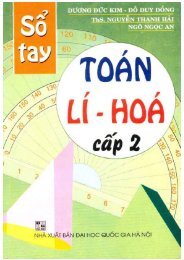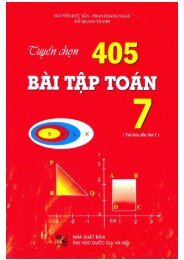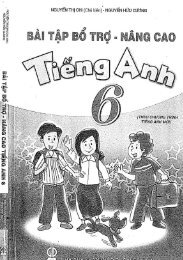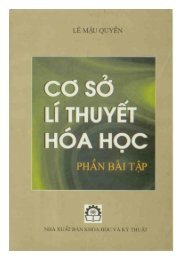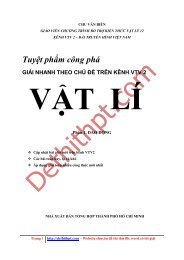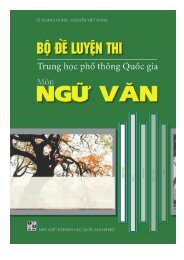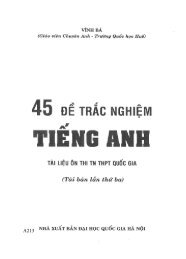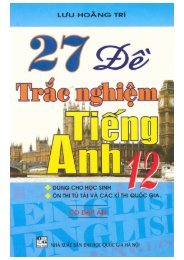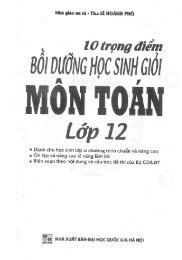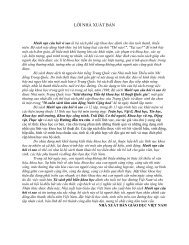Sách giáo viên Tiếng Anh 9 Thí điểm 2 tập (Pilot English 9 for Teacher)
https://app.box.com/s/rnv2yu1duebjhdpkknu2l47p9nmel5ax
https://app.box.com/s/rnv2yu1duebjhdpkknu2l47p9nmel5ax
You also want an ePaper? Increase the reach of your titles
YUMPU automatically turns print PDFs into web optimized ePapers that Google loves.
A CLOSER LOOK 2<br />
Grammar<br />
Despite/In spite of: review<br />
Have Ss read the REMEMBER! box, then ask one or two Ss to summarise the rules. T can write the example<br />
sentences on the board. Ask Ss to give further examples. Make it clear to Ss that these expressions can be<br />
used interchangeably. They both work with all the <strong>for</strong>ms: be<strong>for</strong>e a noun, a noun phrase, or an -ing <strong>for</strong>m.<br />
1 Ask Ss to work individually to fill in the gaps. Check the answers as a class.<br />
Key: 1. loving maths 2. studying hard 3. laziness 4. being short 5. poor health<br />
Verb + to-infinitive/Verb + V-ing<br />
Ask Ss to read the bubble quoted from the GETTING STARTED conversation, then have them read the<br />
structures and examples in the grammar box carefully. Help them with the meanings of the verbs if<br />
necessary.<br />
Divide the board into four columns. Write Verb + to-infinitive, Verb + V-ing, Verb + to-infinitive/V-ing<br />
with no change in meaning in each column, and a column <strong>for</strong> Verb + to-infinitive/V-ing with change<br />
in meaning. Ask four Ss to come to the board to write the verbs mentioned in the grammar box in the<br />
appropriate column. Ask other Ss to give examples with these verbs.<br />
Reference <strong>for</strong> teachers:<br />
Education system in the UK (continued)<br />
Early Years Foundation Stage<br />
Between the ages of 3 and 5, children are considered to be in the Early Years Foundation Stage of<br />
education. All childcare organisations, schools, and nurseries are required to help children develop their<br />
social, creative, language, and literacy skills in a safe and supportive environment.<br />
Primary Education<br />
At age 5, children enter primary school where they begin their basic first stage of education. At the age<br />
of 7 they complete the Key Stage 1 assessments to judge their level of development and abilities.<br />
Primary/Junior Education<br />
Between the ages of 7 and 11, children move on to junior school where they continue their basic<br />
education. At the age of 11 they complete the end of Key Stage 2 assessments to judge their knowledge<br />
and skills in key areas like literacy, numeracy, and science.<br />
Secondary Education<br />
After completing Key Stage 2, students move on to comprehensive school until they reach the age<br />
of 16. From 11 to 14 students receive a general education in a broad curriculum of subjects including<br />
<strong>English</strong>, Maths, Humanities, Languages, Creative Arts, Technology, Physical Education, etc. From the<br />
ages of 14 to 16 students receive more focussed education in around ten subjects (some chosen, and<br />
some compulsory). At the end of Key Stage 4, at age 16, students sit exams to gain GCSE qualifications<br />
or equivalents. Here standards are higher and programmes more challenging.<br />
Further Education<br />
Those who are successful at the end of Key Stage 4 may move on to Further Education, also known<br />
as Sixth Form or Post-16 education. This stage is non-compulsory, and students may choose to leave<br />
school entirely at this point. For two more years students study three or four subjects of their choice.<br />
At the end of Key Stage 5, students sit exams towards A level or equivalent qualifications.<br />
Vocational Education<br />
In addition to academic qualifications, students may begin studying more vocational qualifications<br />
from the age of 14. At Key Stage 4, students must follow a curriculum that is at least partially composed<br />
of academic subjects. <strong>English</strong> and maths are compulsory at Key Stage 4. At Key Stage 5 students can<br />
follow an entirely vocational curriculum if they wish. Popular vocational qualifications include BTECs,<br />
and NVQs.<br />
Unit 12/ My Future Career<br />
75T


